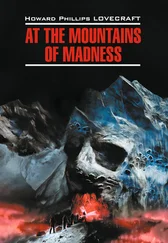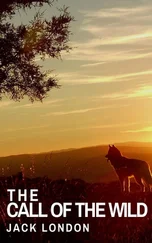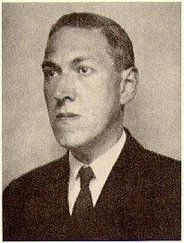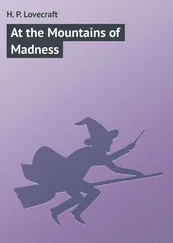There were queer footprints or claw-prints in the mud of brook-margins and barren patches, and curious circles of stones, with the grass around them worn away, which did not seem to have been placed or entirely shaped by Nature. There were, too, certain caves of problematical depth in the sides of the hills; with mouths closed by boulders in a manner scarcely accidental, and with more than an average quota of the queer prints leading both toward and away from them—if indeed the direction of these prints could be justly estimated. And worst of all, there were the things which adventurous people had seen very rarely in the twilight of the remotest valleys and the dense perpendicular woods above the limits of normal hill-climbing.
It would have been less uncomfortable if the stray accounts of these things had not agreed so well. As it was, nearly all the rumours had several points in common; averring that the creatures were a sort of huge, light-red crab with many pairs of legs and with two great bat-like wings in the middle of the back. They sometimes walked on all their legs, and sometimes on the hindmost pair only, using the others to convey large objects of indeterminate nature. On one occasion they were spied in considerable numbers, a detachment of them wading along a shallow woodland watercourse three abreast in evidently disciplined formation. Once a specimen was seen flying—launching itself from the top of a bald, lonely hill at night and vanishing in the sky after its great flapping wings had been silhouetted an instant against the full moon.
These things seemed content, on the whole, to let mankind alone; though they were at times held responsible for the disappearance of venturesome individuals—especially persons who built houses too close to certain valleys or too high up on certain mountains. Many localities came to be known as inadvisable to settle in, the feeling persisting long after the cause was forgotten. People would look up at some of the neighbouring mountain-precipices with a shudder, even when not recalling how many settlers had been lost, and how many farmhouses burnt to ashes, on the lower slopes of those grim, green sentinels.
But while according to the earliest legends the creatures would appear to have harmed only those trespassing on their privacy; there were later accounts of their curiosity respecting men, and of their attempts to establish secret outposts in the human world. There were tales of the queer claw-prints seen around farmhouse windows in the morning, and of occasional disappearances in regions outside the obviously haunted areas. Tales, besides, of buzzing voices in imitation of human speech which made surprising offers to lone travellers on roads and cart-paths in the deep woods, and of children frightened out of their wits by things seen or heard where the primal forest pressed close upon their dooryards. In the final layer of legends—the layer just preceding the decline of superstition and the abandonment of close contact with the dreaded places—there are shocked references to hermits and remote farmers who at some period of life appeared to have undergone a repellent mental change, and who were shunned and whispered about as mortals who had sold themselves to the strange beings. In one of the northeastern counties it seemed to be a fashion about 1800 to accuse eccentric and unpopular recluses of being allies or representatives of the abhorred things.
As to what the things were—explanations naturally varied. The common name applied to them was “those ones”, or “the old ones”, though other terms had a local and transient use. Perhaps the bulk of the Puritan settlers set them down bluntly as familiars of the devil, and made them a basis of awed theological speculation. Those with Celtic legendry in their heritage—mainly the Scotch-Irish element of New Hampshire, and their kindred who had settled in Vermont on Governor Wentworth’s colonial grants—linked them vaguely with the malign fairies and “little people” of the bogs and raths, and protected themselves with scraps of incantation handed down through many generations. But the Indians had the most fantastic theories of all. While different tribal legends differed, there was a marked consensus of belief in certain vital particulars; it being unanimously agreed that the creatures were not native to this earth.
The Pennacook myths, which were the most consistent and picturesque, taught that the Winged Ones came from the Great Bear in the sky, and had mines in our earthly hills whence they took a kind of stone they could not get on any other world. They did not live here, said the myths, but merely maintained outposts and flew back with vast cargoes of stone to their own stars in the north. They harmed only those earth-people who got too near them or spied upon them. Animals shunned them through instinctive hatred, not because of being hunted. They could not eat the things and animals of earth, but brought their own food from the stars. It was bad to get near them, and sometimes young hunters who went into their hills never came back. It was not good, either, to listen to what they whispered at night in the forest with voices like a bee’s that tried to be like the voices of men. They knew the speech of all kinds of men—Pennacooks, Hurons, men of the Five Nations—but did not seem to have or need any speech of their own. They talked with their heads, which changed colour in different ways to mean different things.
All the legendry, of course, white and Indian alike, died down during the nineteenth century, except for occasional atavistical flareups. The ways of the Vermonters became settled; and once their habitual paths and dwellings were established according to a certain fixed plan, they remembered less and less what fears and avoidances had determined that plan, and even that there had been any fears or avoidances. Most people simply knew that certain hilly regions were considered as highly unhealthy, unprofitable, and generally unlucky to live in, and that the farther one kept from them the better off one usually was. In time the ruts of custom and economic interest became so deeply cut in approved places that there was no longer any reason for going outside them, and the haunted hills were left deserted by accident rather than by design. Save during infrequent local scares, only wonder-loving grandmothers and retrospective nonagenarians ever whispered of beings dwelling in those hills; and even such whisperers admitted that there was not much to fear from those things now that they were used to the presence of houses and settlements, and now that human beings let their chosen territory severely alone.
All this I had known from my reading, and from certain folk-tales picked up in New Hampshire; hence when the flood-time rumours began to appear, I could easily guess what imaginative background had evolved them. I took great pains to explain this to my friends, and was correspondingly amused when several contentious souls continued to insist on a possible element of truth in the reports. Such persons tried to point out that the early legends had a significant persistence and uniformity, and that the virtually unexplored nature of the Vermont hills made it unwise to be dogmatic about what might or might not dwell among them; nor could they be silenced by my assurance that all the myths were of a well-known pattern common to most of mankind and determined by early phases of imaginative experience which always produced the same type of delusion.
It was of no use to demonstrate to such opponents that the Vermont myths differed but little in essence from those universal legends of natural personification which filled the ancient world with fauns and dryads and satyrs, suggested the kallikanzari of modern Greece, and gave to wild Wales and Ireland their dark hints of strange, small, and terrible hidden races of troglodytes and burrowers. No use, either, to point out the even more startlingly similar belief of the Nepalese hill tribes in the dreaded Mi-Go or “Abominable Snow-Men” who lurk hideously amidst the ice and rock pinnacles of the Himalayan summits. When I brought up this evidence, my opponents turned it against me by claiming that it must imply some actual historicity for the ancient tales; that it must argue the real existence of some queer elder earth-race, driven to hiding after the advent and dominance of mankind, which might very conceivably have survived in reduced numbers to relatively recent times—or even to the present.
Читать дальше












